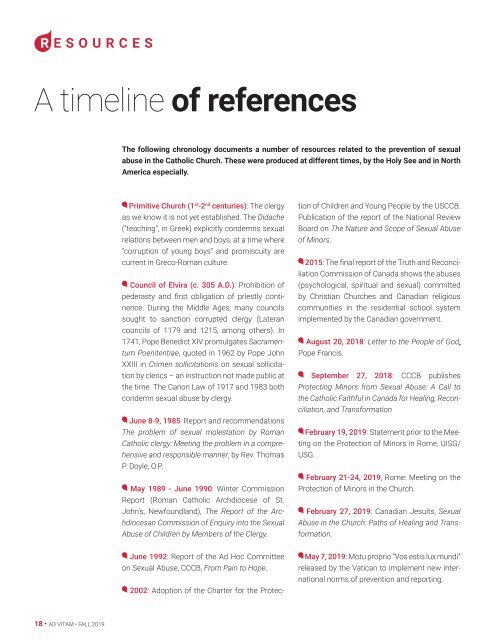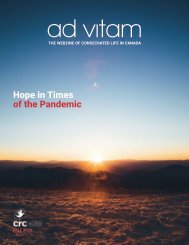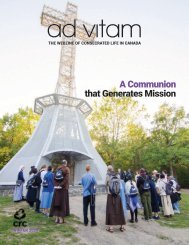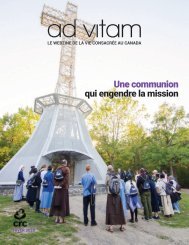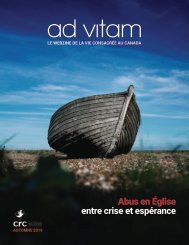ad vitam - Fall 2019
READING TIPS The ad vitam webzine is unique in its offer of an integral and interactive experience featuring articles and audio-visual content. We strongly suggest that you read it online, ideally on a computer or tablet (not recommended on a smartphone). To zoom in: on a computer, double-click or use the + and - found at the bottom-right of the screen; on a tablet, double-tap the screen. Use your mouse or finger to move throughout the page. It is possible to download a PDF of the webzine, however the file will not support links and audio-visual content. For environmental reasons, we invite you to limit printing of the PDF. You may contact us if you wish to obtain a text-only version of a specific article. We hope that as you acquaint yourself with our webzine over time, you’ll enjoy the enriching experience of its unique format. We welcome your comments and questions at info@crc-canada.org.
READING TIPS
The ad vitam webzine is unique in its offer of an integral and interactive experience featuring articles and audio-visual content. We strongly suggest that you read it online, ideally on a computer or tablet (not recommended on a smartphone). To zoom in: on a computer, double-click or use the + and - found at the bottom-right of the screen; on a tablet, double-tap the screen. Use your mouse or finger to move throughout the page.
It is possible to download a PDF of the webzine, however the file will not support links and audio-visual content. For environmental reasons, we invite you to limit printing of the PDF. You may contact us if you wish to obtain a text-only version of a specific article. We hope that as you acquaint yourself with our webzine over time, you’ll enjoy the enriching experience of its unique format. We welcome your comments and questions at info@crc-canada.org.
Create successful ePaper yourself
Turn your PDF publications into a flip-book with our unique Google optimized e-Paper software.
R ESOURCES<br />
A timeline of references<br />
The following chronology documents a number of resources related to the prevention of sexual<br />
abuse in the Catholic Church. These were produced at different times, by the Holy See and in North<br />
America especially.<br />
Primitive Church (1 st -2 nd centuries): The clergy<br />
as we know it is not yet established. The Didache<br />
(“teaching”, in Greek) explicitly condemns sexual<br />
relations between men and boys, at a time where<br />
“corruption of young boys” and promiscuity are<br />
current in Greco-Roman culture.<br />
Council of Elvira (c. 305 A.D.): Prohibition of<br />
pederasty and first obligation of priestly continence.<br />
During the Middle Ages, many councils<br />
sought to sanction corrupted clergy (Lateran<br />
councils of 1179 and 1215, among others). In<br />
1741, Pope Benedict XIV promulgates Sacramentum<br />
Poenitentiae, quoted in 1962 by Pope John<br />
XXIII in Crimen sollicitationis on sexual sollicitation<br />
by clerics – an instruction not m<strong>ad</strong>e public at<br />
the time. The Canon Law of 1917 and 1983 both<br />
condemn sexual abuse by clergy.<br />
June 8-9, 1985: Report and recommendations<br />
The problem of sexual molestation by Roman<br />
Catholic clergy: Meeting the problem in a comprehensive<br />
and responsible manner, by Rev. Thomas<br />
P. Doyle, O.P.<br />
May 1989 - June 1990: Winter Commission<br />
Report (Roman Catholic Archdiocese of St.<br />
John’s, Newfoundland), The Report of the Archdiocesan<br />
Commission of Enquiry into the Sexual<br />
Abuse of Children by Members of the Clergy.<br />
2002: Adoption of the Charter for the Protection<br />
of Children and Young People by the USCCB.<br />
Publication of the report of the National Review<br />
Board on The Nature and Scope of Sexual Abuse<br />
of Minors.<br />
2015: The final report of the Truth and Reconciliation<br />
Commission of Can<strong>ad</strong>a shows the abuses<br />
(psychological, spiritual and sexual) committed<br />
by Christian Churches and Can<strong>ad</strong>ian religious<br />
communities in the residential school system<br />
implemented by the Can<strong>ad</strong>ian government.<br />
August 20, 2018: Letter to the People of God,<br />
Pope Francis.<br />
September 27, 2018: CCCB publishes<br />
Protecting Minors from Sexual Abuse: A Call to<br />
the Catholic Faithful in Can<strong>ad</strong>a for Healing, Reconciliation,<br />
and Transformation<br />
February 19, <strong>2019</strong>: Statement prior to the Meeting<br />
on the Protection of Minors in Rome, UISG/<br />
USG.<br />
February 21-24, <strong>2019</strong>, Rome: Meeting on the<br />
Protection of Minors in the Church.<br />
February 27, <strong>2019</strong>: Can<strong>ad</strong>ian Jesuits, Sexual<br />
Abuse in the Church: Paths of Healing and Transformation.<br />
June 1992: Report of the Ad Hoc Committee<br />
on Sexual Abuse, CCCB, From Pain to Hope.<br />
May 7, <strong>2019</strong>: Motu proprio “Vos estis lux mundi”<br />
released by the Vatican to implement new international<br />
norms of prevention and reporting.<br />
18 • AD VITAM • FALL <strong>2019</strong>


